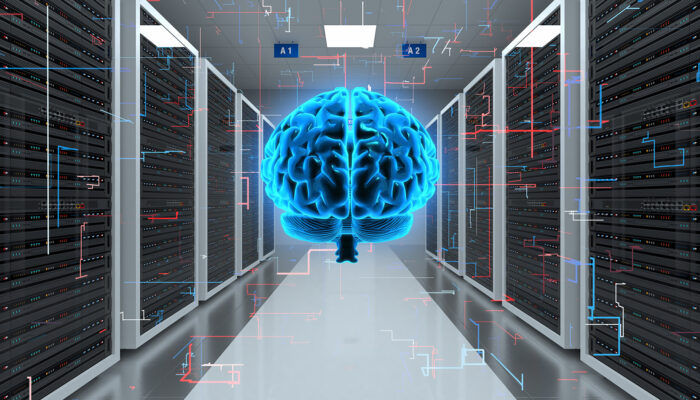The advent of Amazon Web Services (AWS) in the early 2000s marked a significant turning point for enterprise businesses, completely transforming their operations by providing instant access to scalable computing resources. This groundbreaking capability drove innovation, accelerated product development, and enabled the rapid deployment of scalable solutions with enhanced cost-effectiveness. Today, generative artificial intelligence (AI) echoes a similar paradigm shift for enterprise businesses and the broader economy and, with projections indicating the potential contribution an astounding $2.6 to $4.4 trillion to the global economy annually[1], a multitude of industries are expected to be transformed.
Among these, the enterprise software industry is primed for major transformation by generative AI because of three key factors: it is data-rich, highly innovative, and always looking to improve efficiency. Its ability to handle large amounts of data, automate routine tasks, and predict outcomes makes it extremely valuable in this competitive field.
AI’s impact transcends content generation and automation
The emergence of applications such as ChatGPT and Bard, among others, has generated significant excitement and sparked extensive discussions. These sophisticated AI tools have demonstrated remarkable proficiency in content generation and performing various other tasks traditionally carried out by humans. However, beyond the current hype, AI’s true power lies in its capacity to synthesise data and derive insights to enrich human decision-making rather than replace it.
Enhancing human decision making
In today’s world, we are increasingly surrounded by an abundance of data points. However, when it comes to decision-making, businesses frequently find information incomplete or unstructured, making it challenging to make well-informed decisions efficiently. Here, AI emerges as a solution.
AI is transitioning from merely summarising information to synthesising insights from complex datasets. The synthesis of data involves more than just organising or summarising information. This capability allows it to recognise patterns, trends, and hidden relationships that may elude human analysts due to data scale and complexity. By doing so, AI not only provides a comprehensive data perspective but also enables leaders to identify valuable insights and trends, thereby fostering growth and innovation. This transformative role of AI supports and enhances human intelligence and decision-making, rather than replacing it.
For instance, a study of 5.8 million move decisions made by human Go players over the past 71 years exemplifies how AI can improve human decision-making in two critical ways.[2] Firstly, AI can help by identifying patterns that may be overlooked by human players, aiding them in strategic planning. The AI could identify patterns in the data that the human players were unaware of. This allowed the human players to make better decisions about where to place their pieces and how to defend their territory. Second, AI’s capacity to suggest novel strategies stimulates human creativity. The AI was able to suggest new strategies that were not considered before, allowing human players to develop new and innovative ways to win the game.
The implications of AI’s enhancement of decision-making and creativity extend to complex areas like software development. AI can analyse expansive codebases, detecting potential bugs by recognizing problematic code patterns. This shifts developers’ focus from monotonous tasks to more creative ones, like designing new features or enhancing user experiences. Furthermore, AI-assisted coding can lead to improved decision-making in code structuring, algorithm optimization, and application performance.
Tech giants are leading the charge in implementing generative AI in software engineering. For example, GitHub Copilot, which is powered by OpenAI’s GPT-4, provides intelligent code suggestions to developers directly in their coding workflow. This vast reach, coupled with GitHub’s expansive developer base, makes for wide-spread adoption of generative AI in software engineering.
AI will drive demand for intelligence-driven tasks
As AI’s potential and capabilities expand, it not only automates routine tasks but also sparks new demands and opportunities across diverse sectors.
The process of AI handling complex and repetitive tasks frees human resources to engage in more creative and strategic work. AI, therefore, promotes a significant shift in professional roles towards activities that require critical thinking, problem-solving, and innovation. As put by internet pioneer David Gelernter, we are in constant need of more intelligence, and enhancing it with AI proves highly beneficial. This augmentation of human intelligence aligns with key concepts like induced demand and the Jevons Paradox. As we increase the supply of intelligence through AI, we simultaneously stimulate the demand for tasks requiring this enhanced intelligence.
Consequently, AI’s evolution transforms the question from “Will AI replace all the jobs?” to “How can firms leverage AI-enhanced intelligence to improve outcomes?”. This shift in perspective allows us to reshape roles and industries and drive innovation and progress.
Enterprise software companies stand to benefit most from the intelligence boom
Appreciating AI’s potential requires recognising its distinct applications in business to consumer (B2C) and business to business (B2B) domains.[3]
In the consumer sphere, generative AI mainly finds use in personal and entertainment purposes, from AI-generated art or music, as well as engaging with AI entities like ChatGPT. In these scenarios, the emphasis is often placed on the novelty and quantity of the output rather than its quality.
Contrastingly, in a business context, the key determinants are efficiency and quality. The aim is to leverage AI to make informed decisions and generate superior outcomes. For example, AI can transform software engineering across various stages of the development lifecycle, from designing, coding, and testing to maintaining software systems, making these businesses more efficient and competitive.[4]
In the inception and planning phase, software engineers and product managers can employ AI for vast data analysis, cleaning, and labelling. This process includes interpreting user feedback, identifying market trends, and scrutinising system logs. Consequently, teams can expedite data analysis, glean critical insights, and base decisions on a profound understanding of user needs and market dynamics.
In the system design phase, AI accelerates IT architecture design creation. Engineers can leverage AI algorithms to produce various potential configurations, enabling rapid iteration and evaluation. This acceleration shortens the system design process, ensuring quicker time-to-market and alignment of the final architecture with set objectives and requirements.
Generative AI also holds substantial value in sales and marketing, notably in crafting outbound sales emails. While AI’s common use is drafting generic emails, its true strength lies in its capability to synthesise information and enhance personalisation.
CFO functions can harness generative AI’s capacity to extract data from multiple sources, identify trends, and generate forecasts and reports. The technology can automate routine tasks, such as writing formulas and queries in Excel, SQL, and BI tools, thereby surfacing patterns that inform company decision-making. It also streamlines report creation, allowing finance teams to concentrate on strategic initiatives.
Lastly, administrative tasks can significantly benefit from generative AI. Areas such as contract generation, invoice management, and procurement can leverage AI for speed and efficiency. The technology can auto-generate and adapt contracts, purchase orders, and invoices, reducing human errors and boosting process efficiency. This advancement consequently paves the way for operating expense reduction.
Future funding will reflect AI’s transformative potential
With an ability to revolutionise how businesses operate across multiple dimensions, Generative AI is poised to drive a new paradigm shift comparable to AWS’s impact on enterprise businesses.
Advances in AI technology over the next few years will pave the way for an abundance of diverse use cases. As these use cases proliferate and AI’s ability to amplify human decision-making becomes more apparent, we anticipate a significant upsurge in AI funding activity. This elevated level of funding will be multi-year and outperform the general tech funding market.
Learn more about us.
View our transactions.










